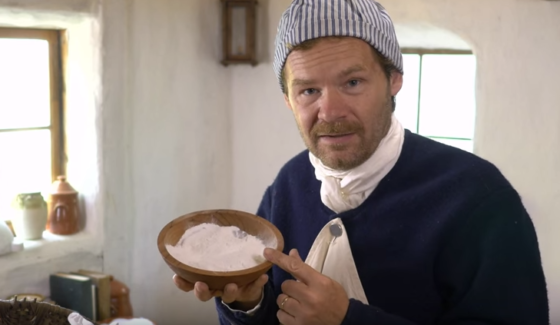Bizarre Ways to Keep Eggs Fresh ”Without a Refrigerator” for Years
In case of an apocalyptic or other scenario in which you can still get eggs but don’t have a fridge handy.
Bizarre Ways to Keep Eggs Fresh ”Without a Refrigerator” for Years
In case of an apocalyptic or other scenario in which you can still get eggs but don’t have a fridge handy.

Yep, down the Internet rabbit hole we went – and here’s what we’ve returned with, just for you. First, a few caveats: These methods are designed for chicken eggs (though we imagine they’d work just as well for duck eggs, too).We haven’t personally tested any of these methods for keeping eggs fresh (nor, ultimately, do we recommend them). But if you’re into experimenting, and you live in the United States, use farm-fresh eggs (that are clean and free of cracks), as opposed to store-bought ones. When a hen lays eggs, they have a naturally occurring coating, called a cuticle or bloom, that prevents bacteria from getting in and moisture from getting out. In the U.S., commercial egg producers are required, per USDA regulations, to power wash eggs prior to selling them, which rinses that coating away.
We’ve learned of at least a half-dozen ways to store eggs for long periods of time. Not surprisingly, most of these methods date back long before the invention of the refrigerator. Some originated in the 1700s or earlier.
Turns out, we aren’t the only people who get into this stuff. Jas. Townsend & Son, Inc., an Indiana-based company that specializes in things like 18th-century reproduction clothing and accessories for Revolutionary War re-enactors, covers such topics on its YouTube series. (Earlier this summer, they broke the Internet with an 18th-century fried chicken recipe.) The video that piqued our interest details the best ways to preserve raw eggs based on 18th-century practices. The company’s president, Jonathan Townsend, wearing colonial-era garb, details the various tricks: Apparently, storing eggs in salt water makes the eggs salty. Storing them in wheat bran makes the eggs taste musty – and after eight months 70 percent of the eggs went bad. Then there’s wood ash, which made the eggs taste like a campfire. That doesn’t sound so bad, and in their experiment, only 20 percent of the eggs spoiled. Other practices included coating eggs in varnish, butter, or rendered animal fat (which had a 40 percent failure rate).

Reddit user Mr. Bungles claimed that he was able to keep eggs fresh for more than a year, by coating them in mineral oil and storing them in the fridge. Technically, does the use of modern technology negate this one? Whatever: “I was planning on letting it go until it failed a float test. But one of my kids ended up eating it, and at that point it was about a week away from being in the fridge for 3 years,” wrote Mr. Bungles on a homesteading subreddit.
An 1862 edition of the Genesee Farmer, a monthly agricultural journal out of Rochester, New York, dedicated a few pages to egg preservation. The piece says one “excellent method” for preserving eggs is to store them in a solution of quicklime, salt, and cream of tartar, which the writer claims can preserve eggs for up to two years.
According to Townsend’s video, though, one method stood out. He says the best way to preserve raw eggs is to store them in a solution of slaked lime (you can find it at a building supply store) and water, which, in his test, had a 100 percent success rate after eight months. That same Genesee Farmer article claimed this method could preserve eggs for six years or longer.
That’s a mighty long time to wait for an omelette.
Follow us
This work is licensed under a Creative Commons Attribution-NoDerivatives 4.0 International License.
Want to republish a Modern Farmer story?
We are happy for Modern Farmer stories to be shared, and encourage you to republish our articles for your audience. When doing so, we ask that you follow these guidelines:
Please credit us and our writers
For the author byline, please use “Author Name, Modern Farmer.” At the top of our stories, if on the web, please include this text and link: “This story was originally published by Modern Farmer.”
Please make sure to include a link back to either our home page or the article URL.
At the bottom of the story, please include the following text:
“Modern Farmer is a nonprofit initiative dedicated to raising awareness and catalyzing action at the intersection of food, agriculture, and society. Read more at <link>Modern Farmer</link>.”
Use our widget
We’d like to be able to track our stories, so we ask that if you republish our content, you do so using our widget (located on the left hand side of the article). The HTML code has a built-in tracker that tells us the data and domain where the story was published, as well as view counts.
Check the image requirements
It’s your responsibility to confirm you're licensed to republish images in our articles. Some images, such as those from commercial providers, don't allow their images to be republished without permission or payment. Copyright terms are generally listed in the image caption and attribution. You are welcome to omit our images or substitute with your own. Charts and interactive graphics follow the same rules.
Don’t change too much. Or, ask us first.
Articles must be republished in their entirety. It’s okay to change references to time (“today” to “yesterday”) or location (“Iowa City, IA” to “here”). But please keep everything else the same.
If you feel strongly that a more material edit needs to be made, get in touch with us at [email protected]. We’re happy to discuss it with the original author, but we must have prior approval for changes before publication.
Special cases
Extracts. You may run the first few lines or paragraphs of the article and then say: “Read the full article at Modern Farmer” with a link back to the original article.
Quotes. You may quote authors provided you include a link back to the article URL.
Translations. These require writer approval. To inquire about translation of a Modern Farmer article, contact us at [email protected]
Signed consent / copyright release forms. These are not required, provided you are following these guidelines.
Print. Articles can be republished in print under these same rules, with the exception that you do not need to include the links.
Tag us
When sharing the story on social media, please tag us using the following: - Twitter (@ModFarm) - Facebook (@ModernFarmerMedia) - Instagram (@modfarm)
Use our content respectfully
Modern Farmer is a nonprofit and as such we share our content for free and in good faith in order to reach new audiences. Respectfully,
No selling ads against our stories. It’s okay to put our stories on pages with ads.
Don’t republish our material wholesale, or automatically; you need to select stories to be republished individually.
You have no rights to sell, license, syndicate, or otherwise represent yourself as the authorized owner of our material to any third parties. This means that you cannot actively publish or submit our work for syndication to third party platforms or apps like Apple News or Google News. We understand that publishers cannot fully control when certain third parties automatically summarize or crawl content from publishers’ own sites.
Keep in touch
We want to hear from you if you love Modern Farmer content, have a collaboration idea, or anything else to share. As a nonprofit outlet, we work in service of our community and are always open to comments, feedback, and ideas. Contact us at [email protected].by Andrew Amelinckx, Modern Farmer
August 18, 2016
Modern Farmer Weekly
Solutions Hub
Innovations, ideas and inspiration. Actionable solutions for a resilient food system.
ExploreExplore other topics
Share With Us
We want to hear from Modern Farmer readers who have thoughtful commentary, actionable solutions, or helpful ideas to share.
SubmitNecessary cookies are absolutely essential for the website to function properly. This category only includes cookies that ensures basic functionalities and security features of the website. These cookies do not store any personal information.
Any cookies that may not be particularly necessary for the website to function and are used specifically to collect user personal data via analytics, ads, other embedded contents are termed as non-necessary cookies.
I remember a product, which I bought in the local pharmacy called “Egg Keep”. It came in a clear glass bottle (approx 12 oz) and had the consistency of mineral oil, but had a different odor. We would take the fresh eggs, rinse and dry them, and immerse them in the Egg Keep. As a side note I also used it in my car’s radiator after I discovered a loss of coolant, and it sealed any small leaks so well I never took the car to a mechanic for any further work!
Sailing Panama to Hilo our eggs lasted over 60 days unrefrigerated in the bow. The technique: turn the boxes over every few days. These were Panamanian farm eggs. NOT mass production.
How long can I keep eggs from refrigeration.
How can that done.
Can I use 14 day old unwashed unrefridgerated eggs to water glass?